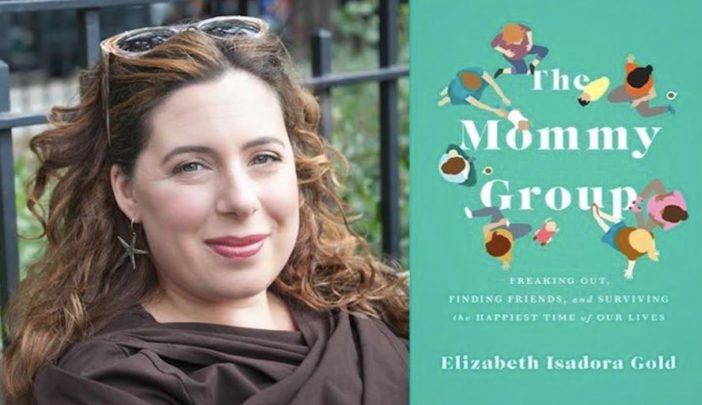Mothers Of Reinvention: Author Elizabeth Isadora Gold Discusses ‘The Mommy Group’


“The baby is a bomb that goes off in the middle room, affecting all aspects of home life, marriage, body and sense of self—especially for mothers,” Elizabeth Isadora Gold writes in The Mommy Group, which was published in March 2016.
A resident of Prospect Heights who writes for The New York Times, The Believer, and a host of other publications, Gold blends journalistic acumen with her personal experience preparing for the birth of her daughter — within the company of six other mothers who banded together.
“My background is a non-fiction writer,” says Gold, who received her M.F.A. from Columbia University. “I look at this as a narrative nonfiction. I didn’t approach it as a ‘mommy book.'”
Freaking Out, Finding Happiness, and Surviving the Happiest Time of Our Lives is the subtitle of Gold’s book, which addresses the immense challenges this group of women endured during both the planning process as well as the post-partum experience.
The particular “Mommy Group” Gold writes about is the one she found via the well-known Park Slope Parents listserv (Gold interviewed PSP found Susan Fox for the book). They were brought together as their “bellies were beginning to show in our second trimester of pregnancy,” she writes.
“I used to think there was something a bit cheesy about Mommy Groups,” says Gold, when asked about her decision to join one.
And while the author focuses specifically on this Mommy Group, the problems that came about are in no way limited to these seven women.
The group began meeting more regularly once their babies were born. One of children had development delays. The author was diagnosed with postpartum anxiety. And perhaps one of the most disturbing stories came from “Anna” (Gold changed the names for her book), whose husband left her days after their baby was born.

While Gold’s book provides a deep look at the details of the group, she also wanted to target big picture change.
“The major conflict that I see between mothers is an economic one complicated by the fact that women have to pay other women with children to take care of their children,” says Gold. “There is almost no communication among working women across class and race.”
The Mommy Group also tackles other uncomfortable subjects — building on Gold’s idea that certain issues simply are “taboo” in public discussion. In one get-together, “Antonia” brings up the issue of post-partum sex:
“‘I don’t know about you guys but things do not feel the same down there. No one tells you when you do natural childbirth how … rearranged you get.’
Those of us who’d had C-sections winced. ‘Guess that’s the only benefit of surgery,’ Melissa said.
I stayed silent. At three months old, Clara was the youngest baby. Danny and I had tried to have sex exactly once. It didn’t go well, and left us sad an confused. Was this all we would be now? Parents?”
“This isn’t The Happiest Baby on the Block,” says Gold, referring to the Harvey Karp book. “There are tons of books about how to raise a child, how to sleep and eat…but there are very few about how to be a mother. You actually become an different person.”
When we asked Gold about the audience for the book, she admitted some of the life crises details could be tough on some readers more than others. “The book could scare the shit out of you if you’re pregnant,” she says. “However it’s also about community — and finding your community. I hope that can speak to everyone.”
And as far as competition among mothers, Gold argues that most of that topic is a myth:
“There is no such thing as ‘The Mommy Wars’. No mommies are ever at war. It’s a marketing term used to sell stuff – one breast pump versus another breast pump. It’s a media term that came from the opt-out [revolution] article that came out. Are women ‘opting out’ of high-powered law jobs? If you want to get a group of second-wave feminists together and talk about the opt-out discussion, they’ll tell you it never happened. It’s a catch phrase, like ‘baby bump’ – it makes them feel comfortable, it has a nice, controversial flare to it.”
“They give you a pamphlet when you get your wisdom teeth out,” says Gold. “Where’s our pamphlet? You get formula samples, cording backing information, indie photo studio options — but for the really difficult things…this is why the seven of us got together.”



